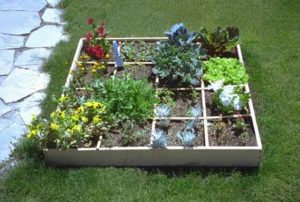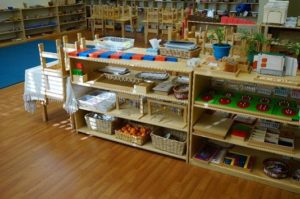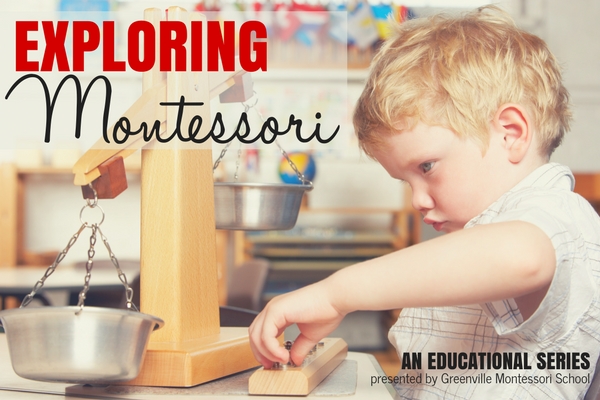Spring is the time that many new parents begin to think about what they want their children’s education to look like. As parents are enrolling all around, now is the time to start exploring and becoming familiar with all the options our area has to offer. In addition to public education, Collin County has a wide variety of educational approaches and schools for you to consider. With the help of Greenville Montessori School, we’ve created this month’s “Exploring Montessori” series as a way to help you become more familiar with one of their options. Stay connected each week as we explore more of the Montessori philosophy.
In the last few years, you may have noticed an increase in the number of Montessori schools that have sprung up in the area. Yet, many parents are not aware of what the ‘Montessori’ philosophy really means; and an equal number have their own pre-conceived notion of how Montessori works.
Who is Maria Montessori?
Montessori education was founded in 1907 by Dr. Maria Montessori, the first woman in Italy to become a physician. She based her educational methods on scientific observation of children’s learning processes. Guided by her discovery that children teach themselves, Dr. Montessori designed an environment in which children could freely choose from a number of developmentally appropriate activities.
When most parents hear “an environment where children choose activities freely”, they think unstructured, chaotic play. This is just one of the many myths we’ll debunk about Montessori as well as a few other misconceptions!
 Myth #1: Montessori is very academic driven with no fun.
Myth #1: Montessori is very academic driven with no fun.
Montessori has 5 main areas in the class: Practical Life, Sensorial, Language, Math and Cultural Studies. In addition to these core Montessori areas, hands-on interaction is also huge in Montessori. A good example is Gardening where children learn about cultivating & nurturing plants. Other activities include outside play time, free choice centers like blocks, building, computers, arts & crafts, music & movement, in-house activities and party fun. The Montessori curriculum does have plenty of time devoted to Recess, PE, Gym, Music, and Art – areas where the children can be free to play and express themselves.
Myth #2: No structure or teacher-direction
The Montessori curriculum is tailored to the individual needs of each child. Unlike traditional schooling, it is not teacher-oriented because we believe each child learns at their own pace and according to their own choice of activities from hundreds of possibilities. Montessori teachers act as guides and consultants. The teacher first presents a lesson, on how to work with the material and then allows the child freedom to choose between 3 to 4 items to work with. Freedom is given within limits. Learning is an exciting process of discovery, leading to concentration, motivation, self-discipline, and a love of learning.
After the child is familiar with the work, he is assessed by the teacher and then moves to the next level. The teacher tracks each child’s progress through on-going assessments to ensure that each child is meeting developmental and educational milestones.
 Myth #3: Mixed age groups in classrooms doesn’t help the children
Myth #3: Mixed age groups in classrooms doesn’t help the children
Traditionally Montessori classes place children in three-year age groups (3-6, 6-9, and so on), forming communities in which the older children spontaneously share their knowledge with the younger ones.
Older children learn responsibility and patience while younger children are inspired to learn and try doing things on their own when they see older children doing it. Having said that, the teacher is still a key component in a child’s development. The teacher spends one-on-one time presenting different lessons and assisting the child in mastering each before moving to the next level.
Myth #4: Montessori children don’t transition well to mainstream schools
Montessori schools typically go up to 3rd or even 6th grade. Children are set up to be more adaptable, independent and self-motivated. They are more accepting of their peers since they work with different age groups. Typically Montessori students tend to be at a more advanced educational level by the time they transition to traditional schools. Psychologists in the US found that across a range of abilities, children at Montessori schools out-performed those given a traditional education. Five-year-old Montessori pupils were better prepared for reading and math, and 12-year-olds wrote “significantly more creative” essays using more sophisticated sentence structures. Some of the biggest differences were seen in social skills and behavior. Montessori children displayed a greater sense of “justice and fairness”, interacted in an “emotionally positive” way, and were less likely to engage in “rough play” during break times.
I hope I have managed to clear some misconceptions or misinformation about Montessori. I highly encourage you to visit a Montessori school in your neighborhood. Ask to do a tour/observation while the students are doing Montessori work. This will help you in understanding more about the philosophy and how kids interact with the material. I will be back next week with another segment!

Collin County Moms Blog is excited to see all that Greenville Montessori School in Allen is doing for children, and if you’re interested in Montessori, we encourage you to reach out to take a tour! To learn more about Greenville Montessori School, make sure to visit their website or Facebook page.
550 Trinity Dr. Allen 75002
(214) 383-5093
* * * *
Ms. Jay Blench is a Montessori certified teacher and school director at Greenville Montessori School in Allen. Teaching is her passion and she has embraced Montessori philosophy since 2000. Feel free to reach out to her at 214-383-5093 if you have any questions or need further clarification on her thoughts in this post.













